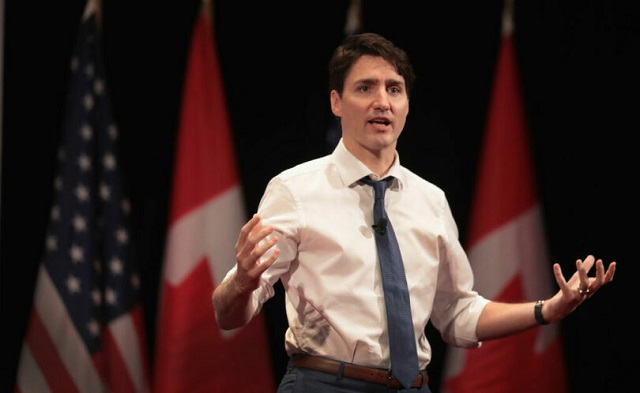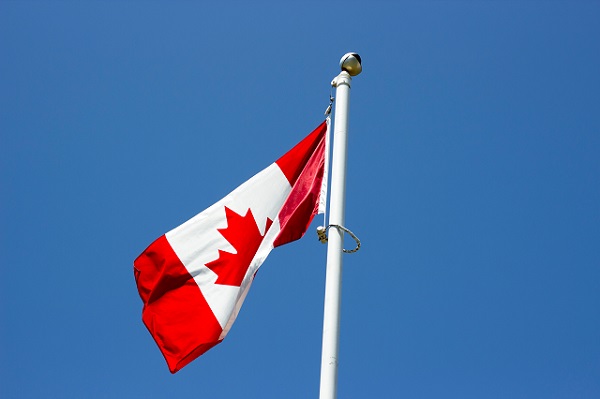Agriculture
Alberta premier slams Trudeau gov’t for ‘ridiculous’ attempt to regulate cattle emissions
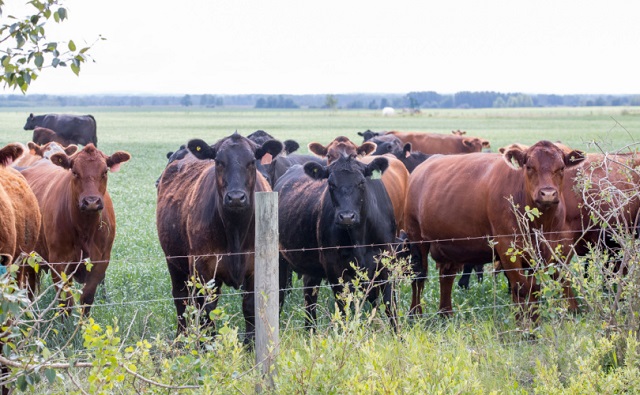
From LifeSiteNews
Danielle Smith said she is in disbelief that limiting cattle farts and burps is an important issue and warned that restrictions could lead to food shortages.
The Premier of Canada’s largest beef-producing province blasted what she said is a “ridiculous” new Liberal federal government climate policy that aims to incentive beef cattle ranchers to reduce how much gas their cows emit by giving them feed additives.
After first attacking Canada’s oil and gas industry a few weeks ago, Prime Minister Justin Trudeau’s Environment Minister Steven Guilbeault announced at the United Nations’ “climate change” COP28 conference in Dubai a few days ago a draft version of Reducing Enteric Methane Emissions from Beef Cattle protocol.
The Trudeau government claims that farmers who participate in the program will get green credits they can sell off to other companies if they can reduce the amount of methane their cows emit, which they say can be done by giving cattle feed additives.
Alberta Premier Danielle Smith said that she was in disbelief the Trudeau government is attacking beef products and food in general.
“Incredibly, this is actually real,” Smith posted Monday on X (formerly Twitter).
“How is going after ranchers and dairy farmers a priority of this federal government? Completely ridiculous.”
Should beef cattle farmers go along with Trudeau’s plan, it would add extra costs that would lead to higher food prices and possibly food shortages.
Cows fed a diet richer in corn silage can reduce how much methane an animal emits; however, this adds costs.
As a natural course of digestion, as will all animals and humans, cows produce methane gas as a byproduct. Methane quickly breaks down in the atmosphere, but the Trudeau government says 31% of emissions from it come from beef and dairy cattle.
For now, the program is aimed just at beef cattle but could be extended to dairy livestock in the future.
The only other alternative for Canadian farmers to reduce the amount of gas their animals produce is to cull their herds, which does not seem to be on the table but has occurred in other nations.
Cattle farmers in Ireland and the Netherlands have faced actual forced reduction cuts in their herd size via government mandates.
Smith said Guilbeault’s plan to try and stop cows from farting and burping is a “new low.”
“Some astute journalists have flagged that the Federal government’s bizarre cow emissions announcement calls for using chemical additives to reduce methane emissions. A new low for the eco-extremists,” she wrote on X (formerly Twitter).
Guilbeault’s new incentives in trying to stop cows from farting and burping are just the latest in a series of his climate change announcements.
Earlier at COP28, he unveiled a plan to slash oil and gas emissions by 35%-38% below 2019 levels. He claimed that it is important to reach “carbon neutrality in Canada by 2050.”
Smith blasted him as a “menace” for going after her province and the oil and gas industry in general and vowed to fight him with every tool available to her government.
Last week, she warned the federal government under Trudeau to “watch” her over how she will shield her province from economic damage and high fuel prices after the feds announced Guilbeault’s plan to cut oil and gas production by a third by 2030 via an “emissions” reduction scheme.
‘Globalist’ has master plan to control food supply and force people to eat ‘bugs,’ says notable doctor
In a recent opinion piece posted to LifeSiteNews, Dr. Joseph Mercola noted how if “government and corporate entities are able to take control of the land, they can control the food supply and, with it, the people.”
“Ultimately, the war against farmers is a war on the whole of humanity, one that threatens what it means to be free,” he wrote.
Mercola noted how “Globalists suggest eating bugs will protect the planet by eliminating the need for livestock, cutting down on agricultural land use and protecting the environment.”
He highlighted the United Nations Food and Agriculture Organization, which encourages the consumption of insects and insect-based foods, as an example.
Mercola also observed how Epoch Times reporter Roman Balmakov stated in his “No Farmers, No Food: Will You Eat the Bugs?” show that “The people in charge of some of the most powerful organizations on the planet have determined that agriculture, specifically animal agriculture, is to blame for global warming, and global warming is to blame for the high prices of food as well as food shortages.”
Trudeau’s current environmental goals are in lockstep with the United Nations’ “2030 Agenda for Sustainable Development” and include phasing out coal-fired power plants, reducing fertilizer usage, and curbing natural gas use over the coming decades, as well as curbing red meat and dairy consumption while promoting people eat ‘bugs” instead.
The reduction and eventual elimination of the use of so-called “fossil fuels” and a transition to unreliable “green” energy has also been pushed by the World Economic Forum (WEF) – the globalist group behind the socialist “Great Reset” agenda – an organization in which Trudeau and some of his cabinet are involved.
Agriculture
Bill C-282, now in the Senate, risks holding back other economic sectors and further burdening consumers

From the Frontier Centre for Public Policy
Bill C-282 currently sits in the Canadian Senate and stands on the precipice of becoming law in a matter of weeks. Essentially, this bill seeks to bestow immunity upon supply management from any potential future trade negotiations without offering increased market access to potential trade partners.
In simpler terms, it risks holding all other economic sectors hostage solely to safeguard the interests of a small, privileged group of farmers. This is far from an optimal scenario, and the implications of this bill spell bad news for Canadians.
Supply management, which governs poultry, egg, and dairy production in Canada, has traditionally enabled us to fulfill our domestic needs. Under this system, farmers are allocated government-sanctioned quotas to produce food for the nation. At the same time, high tariffs are imposed on imports of items such as chicken, butter, yogurt, cheese, milk, and eggs. This model has been in place for over five decades, ostensibly to shield family farms from economic volatility.
However, despite the implementation of supply management, Canada has witnessed a comparable decline in the number of farms as the United States, where a national supply management scheme does not exist. Supply management has failed to preserve much of anything beyond enriching select agricultural sectors.
For instance, dairy farmers now possess quotas valued at over $25 billion while concurrently burdening dairy processors with the highest-priced industrial milk in the Western world. Recent data indicates a significant surge in prices at the grocery store, with yogurt prices alone soaring by over 30 percent since December 2023. This escalation is increasingly straining the budgets of many consumers.
It’s evident to those knowledgeable about the situation that the emergence of Bill C-282 should come as no surprise. Proponents of supply management exert considerable influence over politicians across party lines, compelling them to support this bill to safeguard the interests of less than one percent of our economy, much to the ignorance of most Canadians. In the last federal budget, the dairy industry alone received over $300 million in research funds, funds that arguably exceed their actual needs.
While Canada’s agricultural sector accounts for approximately seven percent of our GDP, supply-managed industries represent only a small fraction of that figure. Supply-managed farms represent about five percent of all farms in Canada. Forging trade agreements with key partners such as India, China, and the United Kingdom is imperative not only for sectors like automotive, pharmaceuticals, and biotechnology but for the vast majority of farms in livestock and grains to thrive and contribute to global welfare and prosperity. It is essential to recognize that Canada has much more to offer than merely self-sufficiency in food production.
Over time, the marketing boards overseeing quotas for farmers have amassed significant power and have proven themselves politically aggressive. They vehemently oppose any challenges to the existing system, targeting politicians, academics, and groups advocating for reform or abolition. Despite occasional resistance from MPs and Senators, no major political party has dared to question the disproportionate protection afforded to one sector over others. Strengthening our supply-managed sectors necessitates embracing competition, which can only serve to enhance their resilience and competitiveness.
A recent example of the consequences of protectionism is the United Kingdom’s decision to walk away from trade negotiations with Canada due to disagreements over access to our dairy market. Not only do many Canadians appreciate the quality of British cheese, but increased competition in the dairy section would also help drive prices down, a welcome relief given current economic challenges.
In the past decade, Canada has ratified trade agreements such as CUSMA, CETA, and CPTPP, all of which entailed breaches in our supply management regime. Despite initial concerns from farmers, particularly regarding the impact on poultry, eggs, and dairy, these sectors have fared well. A dairy farm in Ontario recently sold for a staggering $21.5 million in Oxford County. Claims of losses resulting from increased market access are often unfounded, as farmer boards simply adjust quotas when producers exit the industry.
In essence, Bill C-282 represents a misguided initiative driven by farmer boards capitalizing on the ignorance of urban residents and politicians regarding rural realities. Embracing further protectionism will not only harm consumers yearning for more competition at the grocery store but also impede the growth opportunities of various agricultural sectors striving to compete globally and stifle the expansion prospects of non-agricultural sectors seeking increased market access.
Dr. Sylvain Charlebois is senior director of the agri-food analytics lab and a professor in food distribution and policy at Dalhousie University.
Agriculture
How oil and gas support food security in Canada and around the world
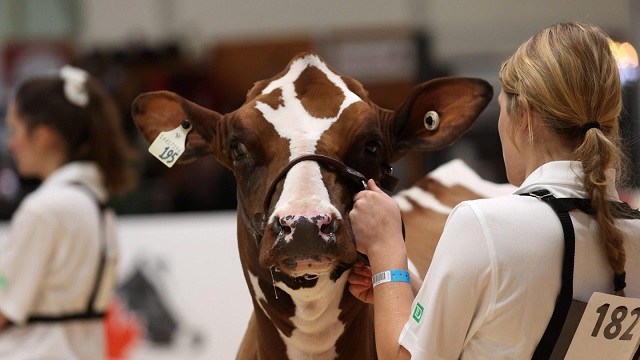
General view of the ‘TD Canadian 4-H Dairy Classic Showmanship’ within the 101st edition of Royal Agricultural Winter Fair at Exhibition Place in Toronto, Ontario, on November 6, 2023. The Royal is the largest combined indoor agriculture fair and international equestrian competition in the world. Getty Images photo
From the Canadian Energy Centre
‘Agriculture requires fuel, and it requires lubricants. It requires heat and electricity. Modern agriculture can’t be done without energy’
Agriculture and oil and gas are two of Canada’s biggest businesses – and they are closely linked, industry leaders say.
From nitrogen-based fertilizer to heating and equipment fuels, oil and gas are the backbone of Canada’s farms, providing food security for Canadians and exports to nearly 200 countries around the world.
“Canada is a country that is rich in natural resources, and we are among the best, I would even characterize as the best, in terms of the production of sustainable energy and food, not only for Canadians but for the rest of the world,” said Don Smith, chief operating officer of the United Farmers of Alberta Co-operative.
“The two are very closely linked together… Agriculture requires fuel, and it requires lubricants. It requires heat and electricity. Modern agriculture can’t be done without energy, and it is a significant portion of operating expenses on a farm.”
The need for stable food sources is critical to a global economy whose population is set to reach 9.7 billion people by 2050.
The main pillars of food security are availability and affordability, said Keith Currie, president of the Canadian Federation of Agriculture (CFA).
“In Canada, availability is not so much an issue. We are a very productive country when it comes to agriculture products and food products. But food affordability has become an issue for a number of people,” said Currie, who is also on the advisory council for the advocacy group Energy for a Secure Future.
The average price of food bought in stores increased by nearly 25 per cent over the last five years, according to Statistics Canada.
Restricting access to oil and gas, or policies like carbon taxes that increase the cost for farmers to use these fuels, risk increasing food costs even more for Canadians and making Canadian food exports less attractive to global customers, CFA says.
“Canada is an exporting nation when it comes to food. In order for us to be competitive we not only have to have the right trade deals in place, but we have to be competitive price wise too,” Currie said.

Under an incredible Saskatchewan sky, a farmer walks toward his air seeder to begin the process of planting this year’s crop. Getty Images photo
Canada is the fifth-largest exporter of agri-food and seafood in the world, exporting approximately $93 billion of products in 2022, according to Agriculture Canada.
Meanwhile, Canadians spent nearly $190 billion on food, beverage, tobacco and cannabis products in 2022, representing the third-largest household expenditure category after transportation and shelter.
Currie said there are opportunities for renewable energy to help supplement oil and gas in agriculture, particularly in biofuels.
“But we’re not at a point from a production standpoint or an overall infrastructure standpoint where it’s a go-to right away,” he said.
“We need the infrastructure and we need probably a lot of incentives before we can even think about moving away from the oil and gas sector as a supplier of energy right now.”
Worldwide demand for oil and gas in the agriculture sector continues to grow, according to CEC Research.
Driven by Africa and Latin America, global oil use in agriculture increased to 118 million tonnes of oil equivalent (Mtoe) in 2022, up from 110 million tonnes in 1990.
Demand for natural gas also increased — from 7.5 Mtoe in 1990 to 11 Mtoe in 2022.
Sylvain Charlebois, senior director, in the Agri-Food Analytics Lab at Dalhousie University, said food security depends on three pillars – access, safety, and affordability.
“Countries are food secure on different levels. Canada’s situation I think is envious to be honest. I think we’re doing very well compared to other countries, especially when it comes to safety and access,” said Charlebois.
“If you have a food insecure population, civil unrest is more likely, tensions, and political instability in different regions become more of a possibility.”
As a country, access to affordable energy is key as well, he said.
“The food industry highly depends on energy sources and of course food is energy. More and more we’re seeing a convergence of the two worlds – food and energy… It forces the food sector to play a much larger role in the energy agenda of a country like Canada.”
-

 Business1 day ago
Business1 day agoDon’t be fooled by high-speed rail
-

 Alberta1 day ago
Alberta1 day agoActivity-Based Hospital Funding in Alberta: Insights from Quebec and Australia
-

 Business1 day ago
Business1 day agoUN plastics plans are unscientific and unrealistic
-

 Business1 day ago
Business1 day agoTaxpayers criticize Trudeau and Ford for Honda deal
-
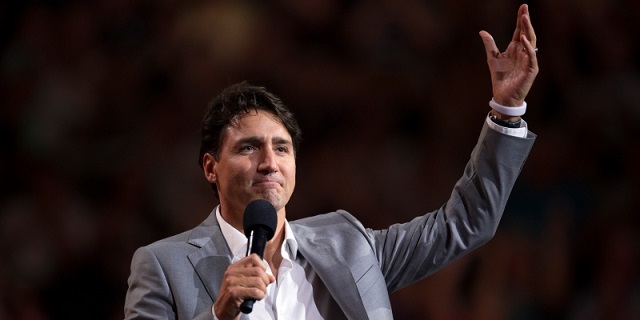
 Fraser Institute1 day ago
Fraser Institute1 day agoCanadians should decide what to do with their money—not politicians and bureaucrats
-

 Addictions1 day ago
Addictions1 day agoBritish Columbia should allow addicts to possess even more drugs, federal report suggests
-

 Alberta1 day ago
Alberta1 day agoAlberta official reveals ‘almost all’ wildfires in province this year have been started by humans
-

 Alberta1 day ago
Alberta1 day agoPolitical parties will be part of municipal elections in Edmonton and Calgary pilot projects

